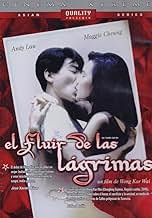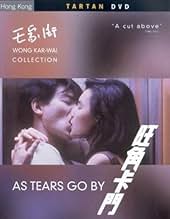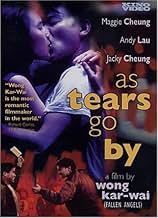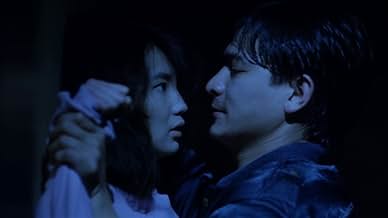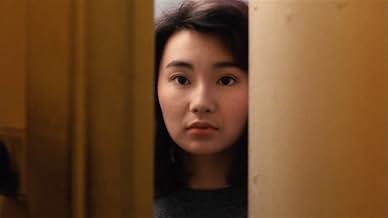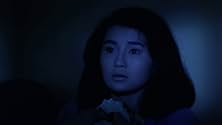IMDb RATING
7.0/10
14K
YOUR RATING
Mid-level gangster Wah falls in love with his beautiful cousin, but must also continue to protect his volatile partner-in-crime and friend, Fly.Mid-level gangster Wah falls in love with his beautiful cousin, but must also continue to protect his volatile partner-in-crime and friend, Fly.Mid-level gangster Wah falls in love with his beautiful cousin, but must also continue to protect his volatile partner-in-crime and friend, Fly.
- Awards
- 2 wins & 10 nominations total
- Director
- Writers
- All cast & crew
- Production, box office & more at IMDbPro
Featured reviews
For me, Kar-Wai is one of the great contemporary directors. This is his first feature, and is rather a conventional Hong Kong gangster movie. However, it already has elements of the visual style and technical flourish that are utilised so well in his later more complex films. An average film with some nice touches, but certainly worth watching for Kar-Wai fans.
Kar-Wai's first film is more in line with the cinematography of other late 80's Hong Kong movies rather than his renown obscure style, seen later on in films like Chungking Express or In the Mood For Love. The characters are also normal in comparison to his later films too, as they take on archetypes seen in many Triad flicks from this era. The writing is classic Wong Kar-Wai however, and what he does with the characters is more interesting then their personalities themselves. In other words their actions speak volumes louder than their dialogue. Andy Lau plays a low-level Triad thug who in hopes of climbing the underworld's ranks becomes held down by his younger brother played by Jacky Cheung. The pair work well together and you begin to like the dynamic bond between them. Trouble ensues between the pair and their gang, and many hard decisions await Andy Lau as he tries to straighten out both his reckless brother and forbidden romance on the side. The ending has a real impact and Wong Kar-Wai's direction is responsible for such a memorable story. Although it feels Kar-Wai wasn't fully at the reigns of this one with some mediocre moments, overall his efforts can be felt wholeheartedly and the passion shines through to deliver a good experience. -7/10
Wong Kar-Wai's feature debut is essential viewing for anyone who's been beguiled by his more recent work, but it is really just a slightly more existential take on the standard HK gangster pic. It has more commercial considerations, less emotional complexity (or navel-gazing, if you side with Jackie Chan, who called him "the most boring film-maker on the planet")* than 'Fallen Angels' or 'In the mood for love', but there's much to admire in his idiosyncratic digressions from generic conventions. Maggie Cheung, surely one of HK's finest actresses, but so rarely allowed to prove it, is slightly wasted here. Her performance is pleasingly internal and understated, far-removed from the pseudo-comic mugging she made to enact in the Police Story movies which made her famous, but her character is really just the pining girlfriend, an iconic figure of a better future. I can fully accept Cheung as the embodiment of all that is feminine and comforting in the world, but her role is a slight disappointment given the screen-melting roles Wong handed to Brigitte Lin, Faye Wong, Karen Mok and Cheung herself in later films. And, by the way, this is very violent.
* Jackie Chan also said that Amy Yip was the ugliest woman in the world and that ladies shouldn't fight in movies.
* Jackie Chan also said that Amy Yip was the ugliest woman in the world and that ladies shouldn't fight in movies.
When it comes to Gangster movies, only the romantic lens of Kar Wai Wong could result in a movie that features a couple captured in loving embrace on its DVD cover and a title befitting a melodramatic sob-fest as opposed to the blood-thirsty, violent display that it actually aspires to be. Awash with a heavy-handed eighties synth-rock soundtrack that does absolutely nothing for the film some twenty years onwards, As Tears Go By is the byproduct of a director being given the reigns for the very first time and quite naturally, not quite knowing how to implement the hundreds of ideas that he has brewing around in his brain. Indeed, while much of the script is very barebones material drawing heavily influences from Scorsese's Mean Streets amongst other higher-budget Hollywood features, it is Wong's frantic, almost schizophrenic pacing and storytelling that gives it a voice of its own. Sure, it's a voice that at this point in time is still very much in its infancy—awkward and stilted—yet you can nevertheless see where the director was going with this, his directorial debut.
Telling the story of two Triad "brothers" as they battle the passions of themselves and those around them, As Tears Go By is an interesting take on the already well-established gangster movie format. Inherent here are the typical staples; the partners at odds with each other, one a young hot-headed blood-thirsty shark looking to go places and his Big Brother, a cool, laid-back veteran with little to no ambition. Brought together, the two end up at odds with other gangsters and loan sharks who consistently threaten death upon both of them should they fail to make ends meet. This tangent which naturally plays out as nine tenths of Wong's story here, bounces back and forth between genuinely compelling action and frustratingly caricaturist drama that seems to repeat itself every twenty minutes. Indeed, if there is any fault to As Tears Go By at all, it exists in Wong's insistence in elaborate, almost inconsequential set-pieces that are fun to watch the first or second time, but wear thin after you realize not much else is happening.
On the other side of the pond however lies a romantic subplot that has given As Tears Go By and indeed Wong himself their names in the cinematic landscape. Centering around the older brother and his passionate affair with his distant cousin who comes to stay for a while, the love story here as it is displayed, is fine and one can understand how audiences may have been moved by its appearance here within an otherwise stoic and bloody display of testosterone, yet suffocated by so much of said action, nothing much is achieved from this deviation. The result is something more akin to a distraction than a truly compelling romance; indeed, while many claim the scene which adorns the DVD cover (which depicts the two in a passionate kiss inside a phone booth) to be representative of Wong's romanticist indulgences that would permeate much of his later career as a film-maker, its initial appearance here is tepid at best. Instead I point to the movie's closing sequence as its most affirming and memorable; it's not exactly a typical Wong depiction, yet it's startling, moving and even just a little bit romantic at the same time too.
In the end, while As Tears Go By stands as a significant and interesting insight into a director's early footsteps in directorial shoes, much of the feature stands as too half-baked in areas that matter most and overly heavy-handed in areas which only lead to grating and often confusing indulgences. Sure enough, the performances are fine and the movie itself exists as a fair enough take on an already done-to-death genre, yet burdened with a fairly straight-forward script that caters very little to Wong's subtler strengths as a director (which he would find a decade on), much of this debut is rendered a mere artifact of curiosity for those interested; those looking for a genuinely thrilling, or enjoyable movie however should stay clear—As Tears Go By certainly has its moments, but lacks the connective tissue to bind it all together.
Telling the story of two Triad "brothers" as they battle the passions of themselves and those around them, As Tears Go By is an interesting take on the already well-established gangster movie format. Inherent here are the typical staples; the partners at odds with each other, one a young hot-headed blood-thirsty shark looking to go places and his Big Brother, a cool, laid-back veteran with little to no ambition. Brought together, the two end up at odds with other gangsters and loan sharks who consistently threaten death upon both of them should they fail to make ends meet. This tangent which naturally plays out as nine tenths of Wong's story here, bounces back and forth between genuinely compelling action and frustratingly caricaturist drama that seems to repeat itself every twenty minutes. Indeed, if there is any fault to As Tears Go By at all, it exists in Wong's insistence in elaborate, almost inconsequential set-pieces that are fun to watch the first or second time, but wear thin after you realize not much else is happening.
On the other side of the pond however lies a romantic subplot that has given As Tears Go By and indeed Wong himself their names in the cinematic landscape. Centering around the older brother and his passionate affair with his distant cousin who comes to stay for a while, the love story here as it is displayed, is fine and one can understand how audiences may have been moved by its appearance here within an otherwise stoic and bloody display of testosterone, yet suffocated by so much of said action, nothing much is achieved from this deviation. The result is something more akin to a distraction than a truly compelling romance; indeed, while many claim the scene which adorns the DVD cover (which depicts the two in a passionate kiss inside a phone booth) to be representative of Wong's romanticist indulgences that would permeate much of his later career as a film-maker, its initial appearance here is tepid at best. Instead I point to the movie's closing sequence as its most affirming and memorable; it's not exactly a typical Wong depiction, yet it's startling, moving and even just a little bit romantic at the same time too.
In the end, while As Tears Go By stands as a significant and interesting insight into a director's early footsteps in directorial shoes, much of the feature stands as too half-baked in areas that matter most and overly heavy-handed in areas which only lead to grating and often confusing indulgences. Sure enough, the performances are fine and the movie itself exists as a fair enough take on an already done-to-death genre, yet burdened with a fairly straight-forward script that caters very little to Wong's subtler strengths as a director (which he would find a decade on), much of this debut is rendered a mere artifact of curiosity for those interested; those looking for a genuinely thrilling, or enjoyable movie however should stay clear—As Tears Go By certainly has its moments, but lacks the connective tissue to bind it all together.
Wong Kar Wai's debut effort as a feature film director already showcase flashes of talent from the would-be auteur. ALthough not as groundbreaking or innovative as some of his better known films (eg. Chungking Express/ Fallen Angels), nevertheless it displayed some of his distinct signature styles, (eg. naturalistic & idiosyncratic dialogue, character driven films) and themes(eg. love,urban environment, world in turmoil and chaos)
Obviously inspired by Martin Scorsese's early effort 'Mean Streets', which was in turn partly inspired by 'beat' filmmaker John Cassevetes debut film 'Shadows'; 'As Tears Go by' is 'Mean streets' set in Hong Kong. The harsh depiction of traid and street gang culture is in sharp contrast to the stylish gun-totting hoods from John Woo's 'A Better Tomorrow'. In many ways, Wong's depiction came accross as more bittingly realistic, helped by its many on-location filming (another WKW style). Hong Kong's neon lit streets/dark dingy alleys/fluorescence interiors/late night piers, blended in perfectly with Wong's story set in contemporary urban HK. Very interesting camera work and lighting that is different from the other HK films coming out from that era. It displayed an early WKW visual flare, again evident in Chunking Express and Fallen Angels, which utilizes similar locations and settings, as well as ferentic camera movements and stylised composition. Credit should be due to art director Chang Shu Ping, who collaborated with Wong in all of his subsequent films. Of note too is cinematographer Andrew Lau, who will go on to helm the 'Young & Dangerous' series that bears several visual & subject matter influences from this film.Though I must add that Young & Dangerous portrayal of heroic gansters is more glorifying than Wong's pathetic bloodied characters.
Excellant performances from all three leads, which bagged Jacky CHeung(doing a Robert de niro) the best supporting actor and Andy Lau a nomination for best actor at that year's HK film awards. Maggie Chueng claimed that this was the first time she discovered the true potential of screen acting. Also unforgettable is Alex Man's supporting turn as the most sadistic villian imaginable.
'As Tears go By' is probably the only WKW film that is fully scripted (WOng served as a scriptwriter in other generic HK movies for several years before this effort), and it shows. Some clever and subtle original touches in the first act, that translates Scorsese's tortured characters and ethnic Itlian dispora to local HK flavor and motivations. However, the conflict dragged on by the second act, and the film seems indecisive as whether to focus on the Andy Lau/Maggie Cheung love story arc or on his dillema with his understudy pal Jacky Cheung and their conflict with bad ass Alex Man. Scorsese's 'Mean Streets' works because it manages to stay focus on the main protaganist POV and motivations. The whole film is centered around Harvey Keitel's character, and the other characters serves as his burden to his climb up the mafia ranks. That direction seems lost in Wong's version. The last act/conclusion seems rushed, cliche and definitely predictable. What I suspect, and logically seems plausible, is the interference of the producers and financiers on 'As Tears go by'. WOng had claimed in interviews that his early work was being hampered in many ways by others, hence his firm decision and insistence to be the producer in all his subsequent films. He wants to and achieves total artistic control over all of his later films.
Nevertheless, 'As Tears Go by' is without a doubt a milestone of WOng's career as well as Hong Kong cinema. The visceral on-screen violence, realistc seedy portrayal of HK's underworld and streets locale, and cosmopolitan loves and relationships was never before seen on HK screens during its day. It is preceded only by John Woo's 'A Better Tomorrow', which in many ways is a different kind of film with very different themes. Definitely worth catching for fans of Wong Kar Wai and those who love Hong Kong cinema.
7/10 from me.
Obviously inspired by Martin Scorsese's early effort 'Mean Streets', which was in turn partly inspired by 'beat' filmmaker John Cassevetes debut film 'Shadows'; 'As Tears Go by' is 'Mean streets' set in Hong Kong. The harsh depiction of traid and street gang culture is in sharp contrast to the stylish gun-totting hoods from John Woo's 'A Better Tomorrow'. In many ways, Wong's depiction came accross as more bittingly realistic, helped by its many on-location filming (another WKW style). Hong Kong's neon lit streets/dark dingy alleys/fluorescence interiors/late night piers, blended in perfectly with Wong's story set in contemporary urban HK. Very interesting camera work and lighting that is different from the other HK films coming out from that era. It displayed an early WKW visual flare, again evident in Chunking Express and Fallen Angels, which utilizes similar locations and settings, as well as ferentic camera movements and stylised composition. Credit should be due to art director Chang Shu Ping, who collaborated with Wong in all of his subsequent films. Of note too is cinematographer Andrew Lau, who will go on to helm the 'Young & Dangerous' series that bears several visual & subject matter influences from this film.Though I must add that Young & Dangerous portrayal of heroic gansters is more glorifying than Wong's pathetic bloodied characters.
Excellant performances from all three leads, which bagged Jacky CHeung(doing a Robert de niro) the best supporting actor and Andy Lau a nomination for best actor at that year's HK film awards. Maggie Chueng claimed that this was the first time she discovered the true potential of screen acting. Also unforgettable is Alex Man's supporting turn as the most sadistic villian imaginable.
'As Tears go By' is probably the only WKW film that is fully scripted (WOng served as a scriptwriter in other generic HK movies for several years before this effort), and it shows. Some clever and subtle original touches in the first act, that translates Scorsese's tortured characters and ethnic Itlian dispora to local HK flavor and motivations. However, the conflict dragged on by the second act, and the film seems indecisive as whether to focus on the Andy Lau/Maggie Cheung love story arc or on his dillema with his understudy pal Jacky Cheung and their conflict with bad ass Alex Man. Scorsese's 'Mean Streets' works because it manages to stay focus on the main protaganist POV and motivations. The whole film is centered around Harvey Keitel's character, and the other characters serves as his burden to his climb up the mafia ranks. That direction seems lost in Wong's version. The last act/conclusion seems rushed, cliche and definitely predictable. What I suspect, and logically seems plausible, is the interference of the producers and financiers on 'As Tears go by'. WOng had claimed in interviews that his early work was being hampered in many ways by others, hence his firm decision and insistence to be the producer in all his subsequent films. He wants to and achieves total artistic control over all of his later films.
Nevertheless, 'As Tears Go by' is without a doubt a milestone of WOng's career as well as Hong Kong cinema. The visceral on-screen violence, realistc seedy portrayal of HK's underworld and streets locale, and cosmopolitan loves and relationships was never before seen on HK screens during its day. It is preceded only by John Woo's 'A Better Tomorrow', which in many ways is a different kind of film with very different themes. Definitely worth catching for fans of Wong Kar Wai and those who love Hong Kong cinema.
7/10 from me.
Did you know
- TriviaFirst film directed by Wong Kar-Wai.
- GoofsWah's facial bruises shift tremendously near the final scene from the time he got on the bus to the time he met Fly.
- Alternate versionsSome home-video releases have different endings, which differ from the original in tone, editing, and duration. There are two of these alternate endings: one which extends the original ending by 2-1/2 minutes, the other an additional 2 minute "happy" ending. Both alternate endings are included on Criterion's Blu-ray release of the film in 2 bonus tracks, and are available for streaming on the Criterion Channel.
- ConnectionsFeatured in Fandor: Borrowing Time with Wong Kar-wai (2018)
Details
- Release date
- Country of origin
- Language
- Also known as
- As Tears Go By
- Production company
- See more company credits at IMDbPro
Box office
- Gross US & Canada
- $9,436
- Opening weekend US & Canada
- $4,279
- May 4, 2008
- Gross worldwide
- $13,133
Contribute to this page
Suggest an edit or add missing content


